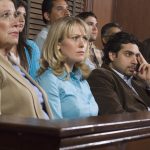What Happens if a Jury Cannot Reach a Unanimous Verdict in NSW?

A jury of 11 will recommence deliberations in Downing Centre District Court today, after returning not guilty verdicts for five out of 26 criminal charges during deliberations after the trial of former Sydney swimming coach Kyle Daniels.
Mr Daniels pleaded not guilty to 26 charges relating to nine complainants, who alleged that he abused them at the Mosman Swim Centre between 2018 and 2019.
The five not guilty verdicts relate to charges arising from alleged conduct against one girl, including four counts of sexual intercourse with a child under 10 years old.
On Friday, one of the original 12 jurors was discharged after advising NSW District Court Judge Kara Shead that she had an interstate flight that evening and would not return to Sydney until after Christmas.
Deliberations were adjourned until today after a second juror was stuck in the Northern Beaches lockdown and could not travel to the Sydney CBD.
The allegations
Mr Daniels, who is in his early twenties, was arrested in 2019 .
It has been alleged that Mr Daniels acted brazenly and opportunistically in taking advantage of students under his care, despite the high risk of detection, to fulfil his own sexual interests.
He has vehemently denied touching female students on or near their genitals while instructing them at the busy pool on Sydney’s north shore.
In court, his criminal defence lawyers questioned the conduct of the police officer in charge of the investigation, including her use of leading questions during interviews with the complainants.
They have also suggested that some complainants’ accounts were contaminated by information they overheard in media reports.
Unable to reach verdict
The jury was sent out for deliberations at 9.15am on Thursday, and returned three-and-a-half hours later to deliver five not guilty verdicts and advise the court that “we are at a deadlock and no amount of time would result in a different outcome”.
Her Honour then delivered what is known as a ‘Black direction’; encouraging the jurors to listen to their fellow jurors, calmly consider their views and weigh up their opinions. In accordance with the standard direction, her Honour told the jurors experience has shown that when given more time, juries are often able to reach a unanimous verdict.
Her Honour assured the jurors there was “no rush” in reaching a verdict.
‘False start’
The current gridlock follows a seven-week trial which has already exceeded its original 5-week estimated time frame.
The trial got off to a false start with the first jury dismissed on the second day of the trial, and a re-start ordered. A new jury was selected and the trial commenced few days later.
What happens if the jury can’t reach a unanimous verdict?
If a jury advises the court that it is unable to reach a verdict after deliberations, as it did in the trial of Mr Daniels, the judge will give the jury what is known as a ‘Black Direction’.
The Black Direction derives its name from the High Court of Australia case of Black v The Queen [1993] HCA 71; (1993) 179 CLR 44.
The Direction seeks to fulfil the utilitarian objective of producing a verdict without putting undue pressure on jurors to change their minds.
The Direction is found at page 51 of the judgement, during which Chief Justice Mason and Justices Brennan, Dawson and McHugh prescribe it in the following terms:
‘Members of the jury, I have been told that you have not been able to reach a verdict so far.
I have the power to discharge you from giving a verdict but I should only do so if I am satisfied that there is no likelihood of genuine agreement being reached after further deliberation.
Judges are usually reluctant to discharge a jury because experience has shown that juries can often agree if given more time to consider and discuss the issues.
But if, after calmly considering the evidence and listening to the opinions of other jurors, you cannot honestly agree with the conclusions of other jurors, you must give effect to your own view of the evidence.
Each of you has sworn or affirmed that you will give a true verdict according to the evidence. That is an important responsibility. You must fulfil it to the best of your ability.
Each of you takes into the jury room your individual experience and wisdom and you are expected to judge the evidence fairly and impartially in that light.
You also have a duty to listen carefully and objectively to the views of every one of your fellow jurors.
You should calmly weigh up one another’s opinions about the evidence and test them by discussion.
Calm and objective discussion of the evidence often leads to a better understanding of the differences of opinion which you may have and may convince you that your original opinion was wrong.
That is not, of course, to suggest that you can, consistently with your oath or affirmation as a juror, join in a verdict if you do not honestly and genuinely think that it is the correct one.
Experience has shown that often juries are able to agree in the end, if they are given more time to consider and discuss the evidence.
For that reason, judges usually request juries to re-examine the matters on which they are in disagreement and to make a further attempt to reach a verdict before they may be discharged.
So, in the light of what I have already said, I ask you to retire again and see whether you can reach a verdict.’
Majority verdict
For state offences, the court has discretion under Section 55F of the Jury Act to allow for ‘majority verdicts’ in criminal trials if the jury is still unable to reach a unanimous verdict.
That section provides that:
- Where a unanimous verdict has not been reached after the jurors have deliberated for a period of at least 8 hours, and
- The court considers that reasonable time has been given considering the nature and complexity of the case, and
- The court is satisfied after questioning one or more of the jurors on oath that it is unlikely a unanimous verdict will be reached,
A ‘majority verdict’ may be agreed upon by 11 jurors where the jury consists of 12 persons, or by 10 jurors where the jury consists of 11 persons.
Hung juries and retrials
A ‘hung jury’ will be declared if a verdict is still not reached, and the prosecution will then decide whether it is in the public interest to retry the case.
Going to court for a criminal trial?
If you have been accused of a serious criminal offence which is headed towards a District or Supreme Court jury trial, call Sydney Criminal Lawyers anytime on 9261 8881 to arrange a free first appointment with a specialist criminal defence team with decades of experience in successfully defending and winning jury trials in New South Wales.








